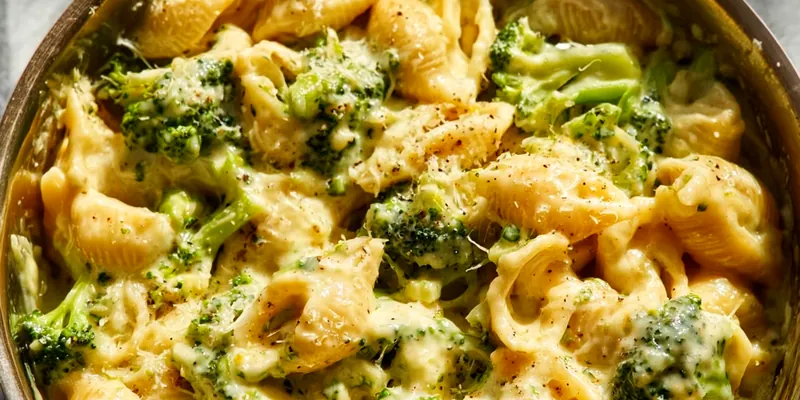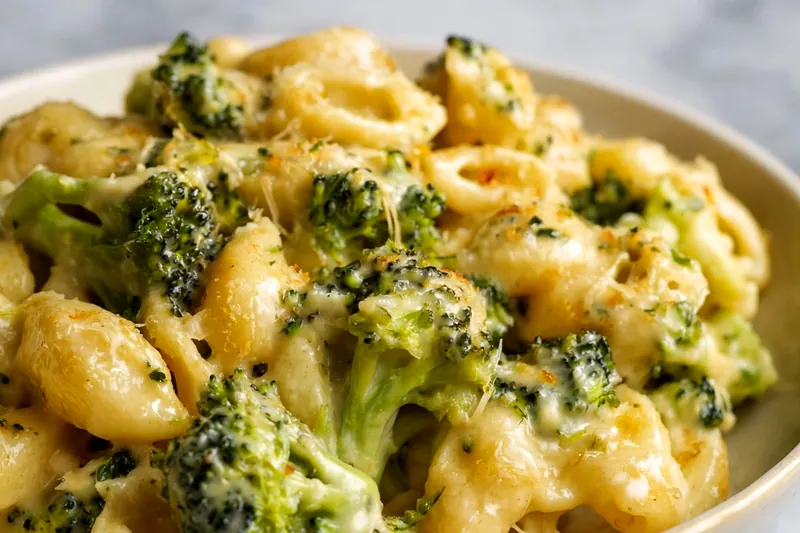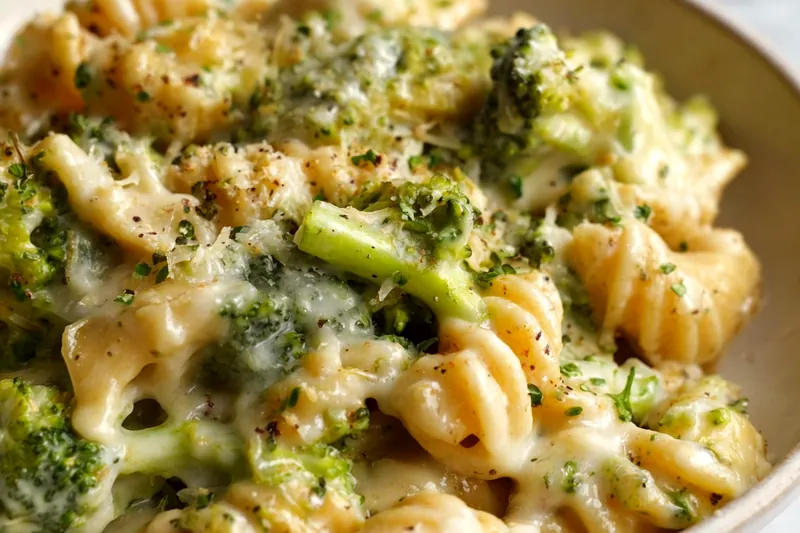Portion of Broccoli Mac and Cheese
Creamy, indulgent broccoli mac and cheese with tender pasta, fresh broccoli florets, and a rich four-cheese sauce. Perfect comfort food for any occasion.

Building the Perfect Cheese Sauce
The secret to exceptional broccoli mac and cheese lies in creating a perfectly smooth, rich cheese sauce. Starting with a proper roux ensures the sauce won't break or become grainy. The combination of four cheeses provides complexity - sharp cheddar for tang, Gruyère for nuttiness, Parmesan for depth, and mozzarella for creaminess.
Temperature control is crucial when adding the cheeses. Remove the sauce from heat before incorporating the cheese to prevent overheating, which can cause the proteins to seize and create a stringy texture. The addition of Dijon mustard enhances the cheese flavors without being detectable.
💡 Professional Tip
Cook the broccoli with the pasta in the same pot during the last 3 minutes. This ensures perfect doneness and saves time while infusing the pasta water with subtle broccoli flavor.
Frequently Asked Questions
Yes, but thaw and drain frozen broccoli thoroughly first. Add it directly to the cheese sauce rather than cooking it with the pasta to prevent overcooking.
Elbow macaroni is classic, but shells, cavatappi, or rotini also work well. Choose shapes with curves or hollows that hold the cheese sauce effectively.
Yes, assemble without the breadcrumb topping, cover and refrigerate up to 24 hours. Add topping before baking and increase cooking time by 10-15 minutes.
Keep heat moderate, remove from heat before adding cheese, and add cheese gradually while stirring constantly. Using room temperature cheese helps it melt more smoothly.
Absolutely! Try sharp white cheddar, fontina, or gouda. Just maintain the same total amount of cheese and include at least one good melting cheese like cheddar or Gruyère.
Look for a golden-brown top and bubbling around the edges. The internal temperature should reach 165°F (74°C) and it should be set but still creamy.
Yes! Cauliflower, peas, or roasted bell peppers work well. Pre-cook harder vegetables and add them with the broccoli to ensure even cooking.
Store covered in the refrigerator for up to 4 days. Reheat in the oven at 350°F with a splash of milk to restore creaminess, or microwave individual portions.
Recipe Troubleshooting Guide
Grainy Cheese Sauce
Problem: Cheese sauce becomes grainy or broken
Solution: Remove from heat immediately, whisk in a splash of cold cream, and strain if necessary. Always add cheese off heat and gradually.
Watery Results
Problem: Mac and cheese turns out watery
Solution: Drain pasta and broccoli thoroughly, cook roux longer to eliminate raw flour taste, and ensure cheese sauce is properly thickened before combining.
Dry Top Layer
Problem: Top becomes too dry during baking
Prevention: Cover with foil for first 20 minutes, then uncover to brown. Ensure adequate cheese sauce and don't overbake.
Bland Flavor
Problem: Final dish lacks flavor depth
Recovery: Season pasta water well, taste sauce before combining, and don't skip the Dijon mustard and nutmeg - they enhance cheese flavors significantly.
Overcooked Broccoli
Problem: Broccoli becomes mushy
Prevention: Add broccoli only in the last 3 minutes of pasta cooking, or steam separately and add to cheese sauce just before baking.
Consistency Issues
Too Sweet: Balance with extra sharp cheddar or a pinch of cayenne
Too Salty: Add more cream or milk to dilute, serve with fresh herbs
Bland: Increase Dijon mustard, add garlic powder, or finish with fresh cracked pepper

Choosing Quality Ingredients
The foundation of exceptional broccoli mac and cheese starts with selecting the right pasta and fresh broccoli. Choose elbow macaroni or similar short pasta that creates pockets for the cheese sauce. Fresh broccoli florets should be bright green and firm, as they'll maintain better texture and color through the cooking process.
Cheese quality makes a dramatic difference in both flavor and melting properties. Use block cheeses and grate them yourself for the smoothest sauce - pre-shredded cheeses contain anti-caking agents that can prevent proper melting. The combination of sharp and mild cheeses creates depth while ensuring excellent meltability.
Essential Ingredient Notes
- Pasta Selection: Choose pasta shapes with curves, ridges, or hollows that capture and hold the cheese sauce effectively. Avoid long pasta shapes for this dish.
- Broccoli Freshness: Look for bright green florets with tight buds and firm stems. Avoid yellowing or flowering broccoli as it will have a stronger, less pleasant flavor.
- Cheese Quality: Grate cheese fresh from blocks for the smoothest melting. Room temperature cheese incorporates more easily into the sauce without clumping.

Mastering the Cooking Process
The key to perfect broccoli mac and cheese lies in timing and temperature control. Cook the pasta just until al dente since it will continue cooking in the oven. Adding the broccoli to the pasta water in the final minutes ensures both components finish simultaneously with perfect texture.
Creating a smooth cheese sauce requires patience and proper technique. The roux must cook long enough to eliminate the raw flour taste, but the cheese should be added off the heat to prevent breaking. The final baking stage should create a golden top while keeping the interior creamy and hot throughout.
The Perfect Roux
Cook the butter and flour mixture for 2-3 minutes while stirring constantly. This eliminates the raw flour taste and creates the proper foundation for a smooth, thick cheese sauce.
Portion of Broccoli Mac and Cheese
📋 Ingredients
For the Base
- 60g butterFor making the roux base
- 45g all-purpose flourThickens the cheese sauce
- 720ml whole milkCreates creamy base
- 240ml heavy creamAdds richness and smoothness
- 200g sharp cheddar cheeseMain flavor component
- 100g Gruyère cheeseAdds nutty complexity
- 50g Parmesan cheeseProvides umami depth
For the Cheese Sauce
- 450g elbow macaroniPerfect shape for holding cheese sauce
- 500g fresh broccoli floretsCut into bite-sized pieces
- 100g mozzarella cheeseAdds stretchy creaminess
- 1 tsp Dijon mustardEnhances cheese flavors
- 1/4 tsp nutmegClassic cheese sauce seasoning
- 80g panko breadcrumbsCreates crispy golden topping
- 30ml melted butterHelps breadcrumbs brown
Instructions
Prepare Pasta and Broccoli
Cook elbow macaroni according to package directions until al dente. In the last 3 minutes, add broccoli florets to the pasta water. Drain together and set aside.
Make Cheese Sauce Base
In a large saucepan, melt butter over medium heat. Whisk in flour and cook for 1-2 minutes. Gradually add milk and cream, whisking constantly until smooth and thickened, about 5-6 minutes.
Add Cheeses and Seasonings
Remove from heat and gradually stir in cheddar, Gruyère, Parmesan, and mozzarella until melted. Add Dijon mustard, garlic powder, onion powder, nutmeg, salt, and pepper. Mix until smooth.
Combine and Transfer
Add cooked pasta and broccoli to the cheese sauce, stirring gently to coat evenly. Transfer to a greased 9x13 inch baking dish. Preheat oven to 375°F (190°C).
Add Topping and Bake
Mix panko breadcrumbs with melted butter and extra Parmesan. Sprinkle over mac and cheese. Bake for 25-30 minutes until golden brown and bubbly. Let rest 5 minutes before serving.
Recipe Notes & Tips
Storage
Leftover broccoli mac and cheese keeps in the refrigerator for up to 4 days. Reheat in the oven at 350°F with a splash of milk to restore creaminess.
Serving Suggestions
Serve as a main dish with a simple green salad, or as a side dish with grilled chicken or pork. The rich flavors pair well with acidic elements like tomatoes or pickled vegetables.
Variations
Try adding cooked bacon bits, caramelized onions, or roasted garlic to the cheese sauce. Different vegetable combinations like cauliflower and peas also work wonderfully in this base recipe.
